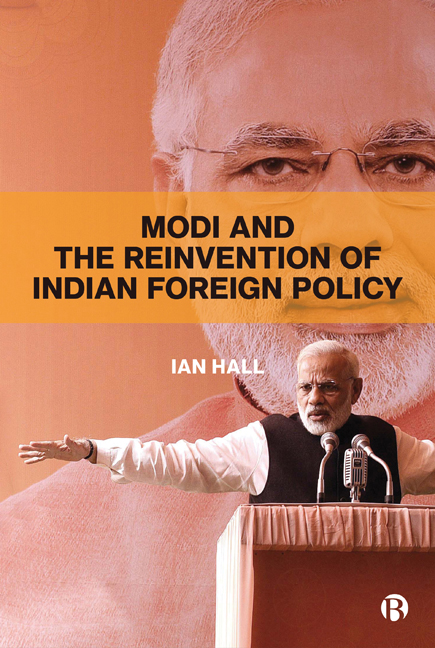Book contents
- Frontmatter
- Contents
- Abbreviations
- Glossary
- Notes on the Author
- Acknowledgements
- Preface
- 1 Introduction
- 2 Nonalignment to Multialignment
- 3 Hindu Nationalism and Foreign Policy
- 4 Modi and Moditva
- 5 World Guru India
- 6 Prosperity and Connectivity
- 7 National Power and Regional Security
- 8 Conclusion
- Notes
- References
- Index
6 - Prosperity and Connectivity
Published online by Cambridge University Press: 10 March 2021
- Frontmatter
- Contents
- Abbreviations
- Glossary
- Notes on the Author
- Acknowledgements
- Preface
- 1 Introduction
- 2 Nonalignment to Multialignment
- 3 Hindu Nationalism and Foreign Policy
- 4 Modi and Moditva
- 5 World Guru India
- 6 Prosperity and Connectivity
- 7 National Power and Regional Security
- 8 Conclusion
- Notes
- References
- Index
Summary
Before and for some time after the 2014 general election, the most widely expressed hope for Modi's government was that it might be more committed to economic liberalisation and to opening up India's markets to the world than its tentative predecessor. As Gujarat Chief Minister, it was observed, Modi had been markedly more friendly to business than many Indian leaders, as well as apparently more successful in delivering growth. The hope that Modi might bring the same approach to New Delhi were reinforced by the Bharatiya Janata Party's (BJP) overt appeals to the Gujarat model (BJP, 2014c), and promises to improve the often parlous state of infrastructure and connectivity within India, as well as with the rest of South Asia, the world's least economically integrated region (BJP, 2014a, pp. 15–16, 32–3). After Modi took office, high expectations were further fuelled by the new Prime Minister's rhetoric, his outreach to business leaders in the US and elsewhere, and his clear instruction to the Ministry of External Affairs (MEA) and India's missions to focus on economic diplomacy. They were stoked by Modi's promises to greet investors with a ‘red carpet, not red tape’ (Modi, 2014e), the unveiling of schemes like ‘Make in India’, launched with a fanfare in September 2014, and ‘Startup India’, announced in his 2015 Independence Day speech. The replacement in January 2015 of the old Planning Commission, with a new body, the National Institute for Transforming India, known as NITI Aayog, and the involvement of well-respected economists like Arvind Panagariya, were also widely praised (see Patnaik, 2015).
Over time, however, disappointment set in among businesspeople, investors and foreign governments about the slow pace of change, as well as among many in the electorate in India concerned with the slower than expected rate of growth (Manor, 2015, p. 739). A lack of progress on domestic economic reform and on liberalising trade – notwithstanding significant changes concerning investment – undermined confidence at home and overseas. Early on, there were worrying signs. In August 2014, Modi's government pulled out of a World Trade Organization (WTO) deal on trade facilitation, agreed at the Bali Conference the previous year, citing concerns about the effects it might have on domestic food security measures.
- Type
- Chapter
- Information
- Modi and the Reinvention of Indian Foreign Policy , pp. 105 - 124Publisher: Bristol University PressPrint publication year: 2019



